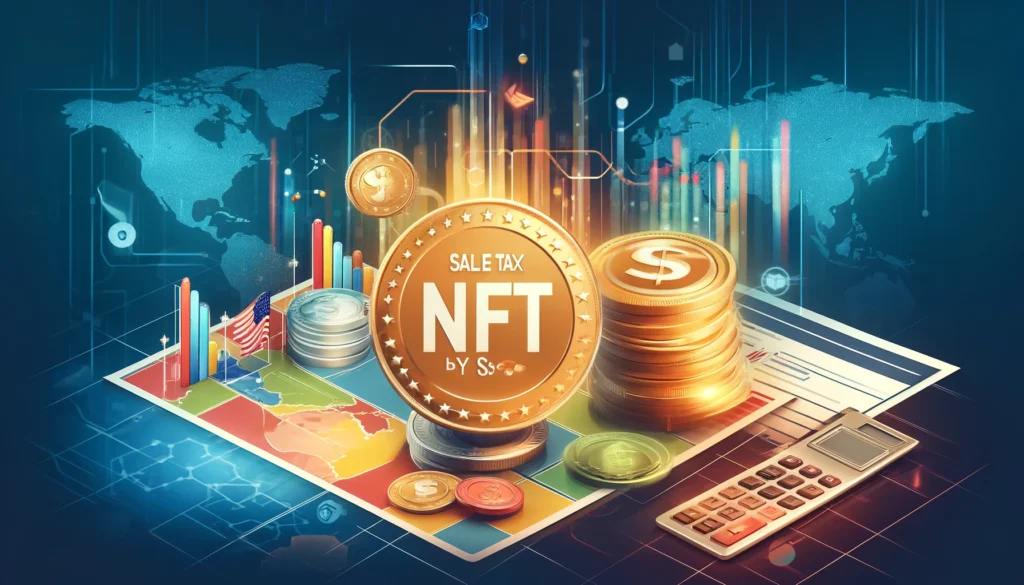Introduction
Taxes on NFTs are a hot topic in 2024. As NFTs become more popular, it’s important to understand how they’re taxed. In this guide, we’ll explain everything you need to know about NFT taxes this year.
In this article, you’ll learn about the different tax rules for buying, selling, and creating NFTs. We’ll also cover special situations like NFT airdrops and donations. Let’s get started!
Table of Contents
What Are NFTs and How Are They Taxed?
NFTs (Non-Fungible Tokens) are unique digital assets that represent ownership of a specific item, like art, music, or even tweets. They are different from cryptocurrencies like Bitcoin because each NFT is unique and can’t be exchanged on a one-to-one basis.
NFTs are taxed based on their use and how they are traded. Here’s a simple breakdown:
Understanding NFTs

NFTs are digital assets stored on a blockchain. This technology ensures that each NFT is one-of-a-kind and cannot be replicated. People use NFTs to buy, sell, and trade digital items like artwork, music, and virtual real estate.
General Tax Rules for NFTs
The IRS treats NFTs as property. This means that buying, selling, or creating NFTs can have tax implications. Let’s break down these rules further:
- Buying NFTs: If you buy an NFT using cryptocurrency, you might need to pay capital gains tax.
- Selling NFTs: Profits from selling NFTs are subject to capital gains tax.
- Creating NFTs: Income from selling NFTs you create is usually considered ordinary income.
Tax Rates for NFTs
The tax rate on NFTs depends on whether the gain is short-term or long-term:
- Short-term Capital Gains: If you hold an NFT for less than a year before selling it, your profit is taxed at your regular income tax rate.
- Long-term Capital Gains: If you hold an NFT for more than a year, you might pay a lower tax rate on your profits.
Example: Buying an NFT with Cryptocurrency
Imagine you bought Ethereum (ETH) for $1,000. Later, the value of ETH rises to $2,000, and you use it to buy an NFT. The IRS considers this a taxable event. You owe capital gains tax on the $1,000 increase in value.
Example: Selling an NFT
Suppose you sell an NFT for $5,000 that you originally bought for $3,000. Your capital gain is $2,000. If you held the NFT for less than a year, you’ll pay tax on this gain at your regular income tax rate. If you held it for more than a year, you might pay a lower rate.
Staying Updated with IRS Guidelines
Tax laws can change, so it’s important to stay updated with the latest IRS guidelines on NFT taxes(We will talk more about this below). The IRS provides resources and updates that can help you understand your tax obligations.
Comparison Table: Short-term vs. Long-term Capital Gains
| Holding Period | Tax Rate Type | Example Scenario |
|---|---|---|
| Less than 1 year | Short-term Capital Gains | Regular income tax rate applied |
| More than 1 year | Long-term Capital Gains | Lower tax rate on gains |
Tax Implications for NFT Buyers

When you buy NFTs, it’s important to understand how these transactions are taxed. Here’s what you need to know about the tax implications for NFT buyers.
Buying NFTs with Cryptocurrency
Buying NFTs with cryptocurrency, like Ethereum (ETH), can create a taxable event. Here’s how it works:
- Capital Gains: If the cryptocurrency you use to buy an NFT has increased in value since you acquired it, you will owe capital gains tax on the gain.
- Example: Suppose you bought 1 ETH for $1,000. Now, 1 ETH is worth $2,000, and you use it to buy an NFT. The IRS sees this as a taxable event, and you owe tax on the $1,000 gain.
Capital gains tax rates can vary. They depend on whether the gain is short-term or long-term:
- Short-term Capital Gains: These are for assets held for less than a year and are taxed at your regular income tax rate.
- Long-term Capital Gains: These are for assets held for more than a year and are usually taxed at a lower rate.
Buying NFTs with Fiat Currency
If you buy NFTs using fiat currency, like US dollars, the tax implications are different:
- Non-Taxable Event: Generally, buying an NFT with fiat currency is not a taxable event. However, this could change if you later sell the NFT.
Let’s break down some key points:
Example: Buying NFTs with USD
Imagine you purchase an NFT for $3,000 using US dollars. At this point, there are no immediate tax consequences. But if you sell the NFT later, you might have to deal with capital gains tax based on the selling price and your cost basis.
Keeping Records
Keeping good records of your NFT transactions is crucial. Here’s why:
- Proof of Purchase: Accurate records can help you prove the purchase price of your NFTs.
- Tracking Gains: Records help you calculate your capital gains accurately when you sell an NFT.
- IRS Requirements: The IRS requires detailed records for all taxable events, including NFT transactions.
Comparing Tax Implications
Let’s compare the tax implications of buying NFTs with cryptocurrency versus fiat currency:
| Transaction Type | Taxable Event | Tax Rate |
|---|---|---|
| Buying with Crypto | Yes | Capital gains tax on crypto gains |
| Buying with Fiat | No | Not taxable at purchase |
Real-World Example
Here’s a real-world example to make it clearer:
- Buying with Crypto: You bought 1 BTC for $10,000. Now, 1 BTC is worth $50,000, and you use it to buy an NFT. You’ll owe capital gains tax on the $40,000 gain.
- Buying with USD: You use $5,000 to buy an NFT. There’s no immediate tax. If you later sell the NFT for $8,000, you’ll owe capital gains tax on the $3,000 gain.
Tax laws can change, so staying updated with the latest IRS guidelines is important. This will help you understand your tax obligations and avoid surprises.
By understanding the tax implications of buying NFTs, you can make more informed decisions and manage your taxes better. Keeping accurate records and staying informed about IRS rules will help you navigate the tax landscape of NFTs.
Tax Implications for NFT Sellers

When you sell NFTs, it’s important to know how these transactions are taxed. Here’s a simple guide to understanding the tax implications for NFT sellers in 2024.
Selling NFTs
Selling NFTs can result in capital gains, which means you might owe taxes on the profit. Here’s how it works:
- Capital Gains Tax: When you sell an NFT for more than you paid, the profit is considered a capital gain.
- Short-term vs. Long-term: The tax rate depends on how long you held the NFT.
Short-term Capital Gains
If you sell an NFT that you’ve held for less than a year, you’ll pay short-term capital gains tax. This tax is the same rate as your regular income tax. For example:
- Regular Income Tax Rate: If your income tax rate is 24%, your short-term capital gains tax rate will also be 24%.
Long-term Capital Gains
If you sell an NFT that you’ve held for more than a year, you’ll pay long-term capital gains tax. This rate is usually lower than the short-term rate. For example:
- Lower Tax Rates: Long-term capital gains tax rates might be 0%, 15%, or 20%, depending on your income level.
Example: Selling an NFT
Let’s say you bought an NFT for $2,000 and sold it for $5,000 after 18 months. Here’s how the tax works:
- Purchase Price: $2,000
- Selling Price: $5,000
- Capital Gain: $3,000 ($5,000 – $2,000)
Since you held the NFT for more than a year, you’ll pay long-term capital gains tax on the $3,000 profit. If your long-term capital gains tax rate is 15%, you’ll owe $450 in taxes.
Tax Implications for NFT Creators

Creating and selling NFTs (Non-Fungible Tokens) can be an exciting venture, but it’s important to understand the tax implications. If you’re an NFT creator, here’s what you need to know about taxes in 2024.
Minting NFTs
Minting is the process of creating an NFT. This can be a taxable event depending on how you handle the sale. Let’s break it down:
- Initial Costs: When you mint an NFT, you often pay a fee known as a gas fee. This fee can be included in your cost basis.
- Taxable Event: Minting itself is not usually taxable. However, when you sell the minted NFT, that’s when taxes come into play.
Example: Minting Costs
Let’s say you create an NFT and pay $50 in gas fees. This fee becomes part of your cost basis. If you sell the NFT for $1,000, your taxable gain is $950 ($1,000 sale price – $50 gas fee).
Selling Minted NFTs
When you sell NFTs you’ve created, the income is generally considered ordinary income or self-employment income. Here’s what you need to know:
- Ordinary Income: If creating and selling NFTs is a side activity, the income is usually taxed as ordinary income.
- Self-Employment Income: If you regularly create and sell NFTs, the IRS may view you as self-employed, requiring you to pay self-employment tax in addition to income tax.
Example: Selling NFTs
Imagine you create an NFT and sell it for $2,000. If you’re considered self-employed, this income is subject to both income tax and self-employment tax. The self-employment tax rate is 15.3%, which covers Social Security and Medicare.
Special Considerations for NFT Creators
There are a few special situations to be aware of:
Royalties from Secondary Sales
Some platforms allow creators to earn royalties when their NFTs are resold. These royalties are also taxable as income. Here’s what to keep in mind:
- Regular Income: Royalties are taxed as regular income.
- Record Keeping: Keep detailed records of all royalty payments to ensure accurate reporting.
Deductible Expenses
As an NFT creator, you can deduct certain expenses related to your work. These might include:
- Software and Tools: Costs for software used to create NFTs.
- Transaction Fees: Fees paid for transactions on NFT platforms.
- Marketing Costs: Expenses for promoting your NFTs.
Staying Updated with IRS Guidelines
Tax laws can change, so it’s important to stay updated with the latest IRS guidelines for NFT creators. Here’s how:
- IRS Website: Check the IRS website regularly for updates on digital assets and tax rules.
- Professional Advice: Consider consulting with a tax professional who specializes in cryptocurrency and digital assets.
Real-World Example
Here’s a real-world example to illustrate these concepts:
- Minting and Selling: You mint an NFT and pay $100 in gas fees. You sell the NFT for $5,000. Your cost basis is $100. Your taxable gain is $4,900.
- Royalties: Your NFT is resold, and you earn $500 in royalties. This $500 is taxable as regular income.
Comparison Table: Income Types for NFT Creators
| Income Type | Tax Treatment | Example Scenario |
|---|---|---|
| Ordinary Income | Regular income tax rate | Side activity income |
| Self-Employment Income | Income + self-employment tax | Regularly creating/selling NFTs |
NFT Sales Tax by State

When you sell NFTs, not only do you have to consider federal taxes, but state taxes can also come into play. Different states in the USA have various rules regarding the sale of digital assets, including NFTs.
Understanding these state-specific regulations is crucial to staying compliant and avoiding unexpected tax bills.
Washington State
Washington is one of the states that has clear rules regarding NFT sales tax. Here’s what you need to know:
- Sales Tax: Washington requires sales tax on the sale of digital goods, including NFTs. This means that if you sell an NFT, you need to collect and remit sales tax to the state.
- Rate: The sales tax rate in Washington varies by location, but it can be as high as 10.4%. Make sure to check the specific rate for your location.
Pennsylvania
Pennsylvania also has specific rules for taxing digital goods, which include NFTs:
- Digital Goods Tax: The state treats NFTs as taxable digital goods. If you sell an NFT to a buyer in Pennsylvania, you need to collect sales tax.
- Rate: Pennsylvania’s sales tax rate is 6%, but local taxes can increase this rate up to 8%.
New York
New York has a broad approach to digital sales tax, which impacts NFT transactions:
- General Tax Rules: New York requires sales tax on many digital goods and services. NFTs fall under this category.
- Rate: The base sales tax rate in New York is 4%, but additional local taxes can bring the total rate up to 8.875% in some areas like New York City.
California
California has some specific rules for digital products, and NFTs are included:
- Taxable Transactions: If you sell NFTs to buyers in California, those sales are subject to sales tax. This applies to both one-time sales and ongoing royalties.
- Rate: The state sales tax rate is 7.25%, but local taxes can push the total rate to around 10.25% in some areas.
Texas
Texas treats digital products, including NFTs, in a specific way:
- Sales Tax Rules: Texas requires sales tax on digital products, and this includes NFTs. Sellers must collect and remit sales tax for NFT transactions.
- Rate: The state sales tax rate is 6.25%, but local jurisdictions can add up to 2%, making the maximum rate 8.25%.
Florida
Florida’s approach to digital sales tax affects NFT transactions:
- Digital Goods: In Florida, the sale of digital goods, including NFTs, is subject to sales tax. Sellers must be aware of these requirements to stay compliant.
- Rate: The state sales tax rate is 6%, but local counties can add an additional discretionary sales surtax.
Illinois
Illinois has clear guidelines for taxing digital goods, impacting NFT sales:
- Tax Rules: Sales of NFTs are subject to Illinois’s sales tax rules, requiring sellers to collect tax on these transactions.
- Rate: The base rate is 6.25%, but with local taxes, the rate can go up to 10.25% in some areas.
State Sales Tax Rates for NFTs
| State | Sales Tax Rate | Notes |
|---|---|---|
| Washington | Up to 10.4% | Varies by location |
| Pennsylvania | 6% – 8% | Includes local taxes |
| New York | 4% – 8.875% | Higher in NYC |
| California | 7.25% – 10.25% | Varies by location |
| Texas | 6.25% – 8.25% | Includes local taxes |
| Florida | 6% + local surtax | Varies by county |
| Illinois | 6.25% – 10.25% | Varies by location |
Understanding the tax implications of selling NFTs in different states helps you stay compliant and avoid surprises. Keeping up-to-date with both federal and state tax laws is crucial for managing your NFT transactions effectively.
NFT Sales Tax by Countries

When selling NFTs internationally, it’s important to understand the sales tax regulations in different countries. Each country has its own rules for digital goods, including NFTs.
This part covers the sales tax implications for NFTs in several major countries: the UK, Canada, Australia, China, New Zealand, Germany, and other European nations.
United Kingdom (UK)
In the UK, the sale of NFTs is subject to VAT (Value-Added Tax). Here’s what you need to know:
- VAT on Digital Goods: The UK considers NFTs as digital goods, which means they are subject to VAT.
- Rate: The standard VAT rate in the UK is 20%. If you sell an NFT, you must collect VAT from the buyer and remit it to HM Revenue and Customs (HMRC).
Canada
Canada has specific rules for taxing digital goods, including NFTs. Here’s a breakdown:
- GST/HST: The sale of NFTs in Canada is subject to Goods and Services Tax (GST) or Harmonized Sales Tax (HST), depending on the province.
- Rates: GST is 5%, but HST rates vary by province, ranging from 13% to 15%.
- Provincial Sales Tax (PST): Some provinces also impose PST on digital goods.
Australia
Australia taxes digital goods, including NFTs, under the Goods and Services Tax (GST):
- GST on Digital Products: NFTs are considered digital products, making them subject to GST.
- Rate: The GST rate in Australia is 10%. Sellers need to collect GST from buyers and remit it to the Australian Taxation Office (ATO).
China
China has specific regulations for digital goods, which include NFTs:
- Value-Added Tax (VAT): NFTs fall under the category of digital goods, making them subject to VAT.
- Rate: The standard VAT rate in China is 13%. Sellers must collect VAT from buyers and remit it to the Chinese tax authorities.
New Zealand
In New Zealand, digital goods like NFTs are subject to Goods and Services Tax (GST):
- GST on Digital Goods: NFTs are considered digital products and are subject to GST.
- Rate: The GST rate in New Zealand is 15%. Sellers need to collect GST from buyers and remit it to the Inland Revenue Department (IRD).
Germany
Germany has clear rules for taxing digital goods, including NFTs:
- VAT on Digital Products: NFTs are subject to VAT in Germany.
- Rate: The standard VAT rate in Germany is 19%. Sellers must collect VAT from buyers and remit it to the Federal Central Tax Office.
Europe (EU Countries)
The European Union (EU) has harmonized VAT rules for digital goods, which include NFTs:
- VAT on Digital Services: NFTs are considered digital services and are subject to VAT in the EU.
- Rate: VAT rates vary by country within the EU, generally ranging from 17% to 27%. Each member state has its own specific rate and regulations.
- One-Stop-Shop (OSS) Scheme: Sellers can use the OSS scheme to simplify VAT reporting across multiple EU countries. This allows them to report and pay VAT through a single EU member state.
VAT/GST Rates for NFTs by Country
| Country | Tax Type | Rate | Notes |
|---|---|---|---|
| UK | VAT | 20% | Standard VAT on digital goods |
| Canada | GST/HST | 5% – 15% | Varies by province |
| Australia | GST | 10% | GST on digital products |
| China | VAT | 13% | Standard VAT on digital goods |
| New Zealand | GST | 15% | GST on digital products |
| Germany | VAT | 19% | Standard VAT on digital goods |
| EU (Various) | VAT | 17% – 27% | Varies by member state, OSS available |
Understanding the sales tax implications of selling NFTs in different countries helps you stay compliant and avoid unexpected tax liabilities.
Staying informed about each country’s tax rules and maintaining accurate records will ensure smooth transactions and compliance with international tax laws.
Special Tax Considerations
When dealing with NFTs, there are a few special tax considerations to keep in mind. These situations include airdrops, play-to-earn (P2E) games, and donating or gifting NFTs. Each of these scenarios has unique tax implications.
NFT Airdrops

Airdrops occur when you receive free NFTs, usually as part of a promotional event or a reward. Here’s how they are taxed:
- Ordinary Income: Airdropped NFTs are taxed as ordinary income at their fair market value when received.
- Example: If you receive an airdrop worth $500, you must report $500 as income on your tax return.
Tax Treatment of Airdropped NFTs
Airdrops can seem like free money, but they come with tax obligations:
- Fair Market Value: The value of the NFT at the time you receive it is what you need to report.
- Record Keeping: Keep detailed records of when you received the airdrop and its value at that time.
Play-to-Earn (P2E) Games
P2E games allow players to earn NFTs and other digital assets. These earnings are also taxable:
- Income Tax: Earnings from P2E games are considered ordinary income.
- Capital Gains: If you sell or trade these NFTs later, you might owe capital gains tax on any profit.
Example: Earnings from P2E Games
Suppose you earn $1,000 worth of NFTs from a game. Here’s what happens:
- Initial Income: Report the $1,000 as ordinary income.
- Selling the NFTs: If you sell them for $1,500, the $500 profit is subject to capital gains tax.
NFT Donations and Gifts
Donating or gifting NFTs has specific tax benefits and rules:
- Charitable Donations: Donating NFTs to a qualified charity can provide a tax deduction. The amount of the deduction depends on the NFT’s fair market value.
- Gifting NFTs: Gifting NFTs to someone else can trigger gift tax rules, but there are exclusions to consider.
Tax Benefits of Donations
Donating NFTs can be a way to support causes and gain tax benefits:
- Fair Market Value Deduction: If you donate an NFT worth $2,000, you may be able to deduct $2,000 from your taxable income, provided you donate to a qualified organization.
- Record Keeping: Keep records of the donation, including the NFT’s value and the recipient organization’s information.
Real-World Example: Donating an NFT
Imagine you donate an NFT valued at $3,000 to a charity. You can:
- Tax Deduction: Claim a $3,000 deduction on your tax return.
- Supporting a Cause: Benefit from supporting a charity while reducing your taxable income.
Special Tax Situations for NFTs
| Scenario | Tax Implication | Example |
|---|---|---|
| Airdropped NFTs | Ordinary Income | Report $500 airdrop as income |
| P2E Game Earnings | Ordinary Income, Capital Gains | Report $1,000 earnings; $500 gain if sold |
| Donating NFTs | Charitable Deduction | Deduct $3,000 donation |
| Gifting NFTs | Potential Gift Tax | Consider gift tax rules and exclusions |
these special tax considerations help you manage your NFT transactions more effectively. Keep accurate records, stay informed about IRS guidelines, and consider consulting a tax professional for complex situations. Also, you can confidently navigate NFTs’ tax landscape and ensure compliance with all tax laws.
Reporting NFT Taxes
Understanding how to report NFT taxes is crucial for staying compliant and avoiding penalties. Here’s a straightforward guide on how to handle your NFT tax reporting.

Required IRS Forms
When it comes to reporting NFT taxes, the IRS requires specific forms. Here’s what you need to know:
- IRS Form 8949: This form is used to report sales and other dispositions of capital assets. You will list each NFT transaction separately, including the date acquired, date sold, proceeds, cost basis, and gain or loss.
- Schedule D: This form summarizes the totals from Form 8949 and includes other details about your capital gains and losses. You’ll transfer the information from Form 8949 to Schedule D to report your total gains and losses on your tax return.
Example of Reporting a Sale
Imagine you sold an NFT for $3,000 that you originally bought for $1,000:
- Form 8949: You’ll enter the purchase date, sale date, sale price ($3,000), cost basis ($1,000), and the gain ($2,000).
- Schedule D: Transfer the $2,000 gain from Form 8949 to Schedule D.
Importance of Accurate Record-Keeping
Keeping accurate records of your NFT transactions is essential for proper tax reporting. Here’s why:
- Proof of Transactions: Records help verify the details of your NFT purchases and sales.
- Calculating Gains and Losses: Accurate records make it easier to calculate your gains and losses, which are necessary for filling out IRS forms correctly.
- IRS Compliance: Good record-keeping helps ensure you comply with IRS rules and avoid potential audits.
What to Record
Here’s a list of what you should record for each NFT transaction:
- Date of Purchase and Sale: Keep track of when you bought and sold each NFT.
- Purchase and Sale Price: Record the amount you paid and received for each NFT.
- Transaction Fees: Include any fees paid during the transaction, as these can affect your cost basis and gains.
Using Crypto Tax Software
To simplify the process of reporting NFT taxes, consider using crypto tax software. These tools can help you track transactions and generate the necessary forms. Here are some benefits and steps:
- Benefits: Crypto tax software can automatically import transactions from your digital wallets and exchanges, calculate gains and losses, and generate IRS forms like Form 8949 and Schedule D.
- Steps to Use:
- Choose a Software: Options include CoinLedger, TokenTax, and others.
- Import Transactions: Connect your wallets and exchanges to the software.
- Review and Adjust: Check the imported data for accuracy and make any necessary adjustments.
- Generate Forms: Use the software to create Form 8949 and Schedule D.
Example: Using CoinLedger
Suppose you use CoinLedger to report your NFT taxes:
- Step 1: Connect your digital wallet to CoinLedger.
- Step 2: Import all your NFT transactions.
- Step 3: Review the imported data for accuracy.
- Step 4: Generate Form 8949 and Schedule D directly from the software.
Manual Reporting vs. Using Software
| Method | Benefits | Drawbacks |
|---|---|---|
| Manual Reporting | Full control over data | Time-consuming and prone to errors |
| Using Software | Automated and accurate forms | May have a cost for premium features |
Using this guide, you can effectively report your NFT taxes and ensure compliance with IRS rules. Accurate record-keeping and the right tools will make the process smoother and help you avoid any tax-related issues.
Tax Strategies for NFT Investors and Creators
When dealing with NFTs, it’s important to know some tax strategies that can help you save money and stay compliant. Whether you are an investor or a creator, these tips can help you manage your tax obligations more effectively.
Tax Loss Harvesting
Tax loss harvesting is a strategy where you sell investments that are underperforming to offset gains from other investments. Here’s how it works for NFTs:
- Offsetting Gains: If you have sold NFTs at a profit, you can sell other NFTs at a loss to reduce your overall capital gains.
- Carry Forward Losses: If your losses exceed your gains, you can carry forward the excess losses to offset gains in future years.
Example of Tax Loss Harvesting
Imagine you sold an NFT for a $5,000 profit. You also own another NFT that has lost $2,000 in value:
- Sell at a Loss: You sell the losing NFT, creating a $2,000 loss.
- Offset Gains: You subtract the $2,000 loss from your $5,000 gain, resulting in a $3,000 net gain. This reduces your taxable income.
Consulting with Tax Professionals
Getting advice from a tax professional who understands NFTs can be very beneficial. Here’s why:
- Expert Guidance: Tax professionals can provide personalized advice based on your specific situation.
- Complex Situations: They can help navigate complex tax scenarios, like international transactions or large-scale NFT investments.
- Staying Compliant: Professionals ensure that you follow all IRS rules and regulations, helping you avoid penalties.
Finding the Right Crypto Tax Advisor
Look for tax professionals with experience in cryptocurrency and digital assets. Here are some tips:
- Credentials: Check their qualifications and certifications.
- Experience: Ask about their experience with NFT and cryptocurrency taxation.
- Reviews: Look for reviews or testimonials from other clients.
Consulting a Tax Professional

Suppose you have made significant profits from selling NFTs and are unsure about the tax implications:
- Consultation: You consult with a tax professional specializing in digital assets.
- Strategy: The advisor helps you implement tax loss harvesting and identifies deductible expenses.
- Outcome: You save money on taxes and ensure compliance with all regulations.
DIY Tax Filing vs. Using a Tax Professional
| Method | Benefits | Drawbacks |
|---|---|---|
| DIY Tax Filing | Cost-effective | Time-consuming and complex |
| Using a Tax Professional | Expert advice and compliance | Additional cost for professional fees |
Maximizing Deductions
As an NFT creator, you can deduct certain expenses related to your work. Here’s what you should know:
- Deductible Expenses: These include software, marketing costs, and transaction fees.
- Record Keeping: Keep detailed records of all expenses to substantiate your deductions.
Example of Deductible Expenses
Imagine you spent $500 on software and $300 on marketing for your NFT creations:
- Software: Deduct the $500 spent on software as a business expense.
- Marketing: Deduct the $300 spent on marketing as well.
Accurate record-keeping and staying informed about the latest tax guidelines are essential for successful NFT tax management.
FAQ Section
What is the tax rate on NFTs?
The tax rate on NFTs depends on how long you hold them before selling. If you hold an NFT for less than a year, it’s considered a short-term gain, taxed at your regular income rate. If you hold it for more than a year, it’s a long-term gain, which is usually taxed at a lower rate.
Do I need to pay taxes on NFT sales?
Yes, you must pay taxes on the profits from NFT sales. These profits are typically considered capital gains. You need to report these gains on your tax return and pay the appropriate taxes based on whether they are short-term or long-term gains.
How do I report NFT income on my tax return?
To report NFT income, you need to use IRS Form 8949. This form lists your capital gains and losses from NFT transactions. After filling out Form 8949, you summarize the totals on Schedule D of your tax return. This helps the IRS see your overall capital gains and losses.
Are gas fees for NFTs tax-deductible?
Yes, gas fees can be added to the cost basis of your NFT. This means when you sell your NFT, the gas fees you paid can reduce your overall capital gain. By including these fees, you lower the taxable amount on your profit.
How does the IRS classify NFTs for tax purposes?
The IRS classifies NFTs similarly to other capital assets. When you sell an NFT for a profit, it’s subject to capital gains tax. If you create or receive an NFT, the value at the time you receive it can be considered ordinary income, depending on the situation.
Are NFTs considered collectibles by the IRS?
Currently, the IRS has not specifically classified NFTs as collectibles. However, they are treated as property for tax purposes. This means they follow similar tax rules to other digital assets, with profits subject to capital gains tax.
How are NFT airdrops taxed?
NFT airdrops are taxed as ordinary income. When you receive an airdrop, you need to report its fair market value at the time of receipt as income. This value is added to your total taxable income for the year.
Do I pay sales tax when buying an NFT?
Whether you pay sales tax on NFT purchases depends on your state’s regulations. Some states have specific rules for taxing digital goods, including NFTs. It’s important to check your local laws to see if you owe sales tax on your NFT purchases.
What forms do I need to file for NFT taxes?
To file NFT taxes, you need IRS Form 8949 for reporting capital gains and losses. After filling out this form, you summarize the totals on Schedule D of your tax return. These forms help the IRS understand your overall gains and losses from NFT transactions.
Can I offset NFT losses against other gains?
Yes, you can use losses from NFT transactions to offset gains from other investments. This can help reduce your overall taxable income. If your losses exceed your gains, you may also carry forward the excess losses to future tax years, further reducing taxable income.
Final Thoughts: NFT Taxes 2024
Understanding NFT taxes is crucial for navigating the growing world of digital assets. This guide provides the key information you need to stay compliant and make the most of your NFT investments. By knowing how NFTs are taxed, keeping accurate records, and using strategies like tax loss harvesting, you can minimize your tax burden.
Consulting with tax professionals and staying updated with IRS guidelines will also help you manage your NFT transactions effectively. With this knowledge, you can confidently invest in and create NFTs while staying on the right side of the law.